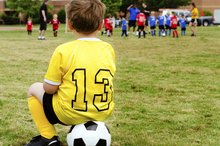The Effect of Visual Media on the Social Behavior of Children
If you worry about the type of media programming your child views and how it influences her behavior, you are not alone. Concerns about the effects of visual media on the social behavior of children escalate as access to violent media abounds in the typical household. More than 30 years of research focusing on the effect of visual media on children and adolescents confirms a relationship between media violence and aggressive behavior. The findings appear consistent whether researchers used a longitudinal, experimental or cross-sectional method.
Dangers of Visual Media
The American Academy of Pediatrics reports that exposure to media violence initiates problems with aggressive behavior, nightmares, desensitization to violence, anxiety and depression 2. Repeated exposure to aggressive media creates an attitude that aggression is an appropriate problem-solving tool that facilitates success. When children perceive frightening themes viewed on media as reality, they determine that their world is a harrowing, sinister place. Children may exhibit sleep problems, miss school, withdraw from friends and fear that they may become a victim of violence.
- The American Academy of Pediatrics reports that exposure to media violence initiates problems with aggressive behavior, nightmares, desensitization to violence, anxiety and depression 2.
Unwarned Parents
Harmful Effects of White Noise Machines
Learn More
Parents that actively monitor their children's visual media may receive inadequate or misleading information. The National Association of School Psychologists reports that fewer than four in 10 programs warn parents about sexual or violent content with a content-based rating system. In a study published in a 2006 issue of "Journal of Consumer Affairs," researchers found that the ratings information for prime-time commercials fails to meet the standard of the Federal Trade Commission and lacks complete ratings disclosure information. Only 20 percent of parents use the viewer-control or v-chip installed on their television and most parents are unaware of its existence.
- Parents that actively monitor their children's visual media may receive inadequate or misleading information.
- The National Association of School Psychologists reports that fewer than four in 10 programs warn parents about sexual or violent content with a content-based rating system.
Vulnerability
Some children may be more at risk to experience negative effects from exposure to visual media. The American Academy of Child and Adolescent Psychiatry reports that a strong correlation exists between exposure to violent media and aggressive behavior among "at risk" adolescents 2. Violent media heroes that "problem-solve" with automatic weapons become role models for adolescents who have been victimized. In the absence of nonviolent models of conflict resolution, these adolescents may mimic the actions of the violent media hero to solve their problems.
- Some children may be more at risk to experience negative effects from exposure to visual media.
- In the absence of nonviolent models of conflict resolution, these adolescents may mimic the actions of the violent media hero to solve their problems.
Implications for Parents
Purple Haze Side Effects
Learn More
Be a positive media role model for your children by your selective use of media and supervision of their visual media exposure. Resist the temptation to use media as a convenient babysitter and stress the value of media-free activities in your home. When parents initiate media education, children become less susceptible to the negative effects of visual media, says the American Academy of Pediatrics 2. Other advantages of media education include making informed media choices, limiting the use of media and acquiring critical thinking and viewing skills.
- Be a positive media role model for your children by your selective use of media and supervision of their visual media exposure.
Related Articles
References
- Education; FAQs on Violent Video Games and Other Media Violence; Craig A. Anderson; 2003
- American Academy of Pediatrics; Media Education; 1999
- University of Michigan Health System; Television and Children; Kyla Boyse; August 2010
- "Social Media Obsession and Addiction." Anxiety and Depression Association of America, November 2018. https://adaa.org/social-media-obsession
- Corrigan, J.R., Alhabash, S., Rousu M., Cash, S.B. "How much is social media worth? Estimating the Value of Facebook by Paying Users to Stop Using It." PLOS ONE, December 2018. https://doi.org/10.1371/journal.pone.0207101
- Meshi Dar, Dar Meshi, Elizarova Anastassia, Bender Andrew, Verdejo-Garcia Antonio. “Excessive Social Media Users Demonstrate Impaired Decision-Making in the Iowa Gambling Task." Journal of Behavior Addictions, January 7, 2019. https://akademiai.com/doi/10.1556/2006.7.2018.138









